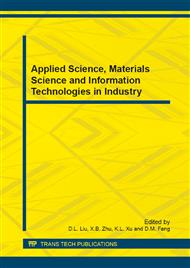[1]
Dong Zhengdong, Dong qiang. HowNet[ DB/ OL ] , http : / / www. keenage. Com.
Google Scholar
[2]
Liu Qiong, Li Shujian. Based on the" HowNet" lexical semantic similarity calculation [C]. The third Chinese Lexical Semantics Workshop in Taipei., (2002)112-117.
Google Scholar
[3]
Vasileios Hatzivassiloglou, Kathleen R. McKeown. Predicting the semantic orientation of adjectives[A]. In: Pro-ceedings of the 35th Annual Meeting of the Association for Computational Linguistics and the 8th Conference of theEuropean Chapter of the ACL[C], (1997).
DOI: 10.3115/976909.979640
Google Scholar
[4]
Turney, Peter, Littman Michael. Measuring praise and criticism: Inference of semantic orientation from association[J]. ACMTransactions on Information Systems, 21(2003) 315-346.
DOI: 10.1145/944012.944013
Google Scholar
[5]
Wu Jian, Wu Zhaohui, Li Ying etc. Web Service Discovery Based on Ontology and Similarity of Words [J]. CH INESE JOURNA L OF COMPU TERS, 28(2005)595~602.
Google Scholar
[6]
Xiong Delan, Chai Yumei. Researching on Feature Selection Method in Domainal Text Appraisive Categorizatio [J]. Micro computer information, 22(2006)263~289.
Google Scholar
[7]
Zhu Yanlan, Min Jin, Zhou Yaqian etc. Semantic Orientation Computing Based on HowNet[J]. Journal of Chinese information processing, 20 (2006) 14-20.
Google Scholar
[8]
Jiang Min, Xiao Shibin, Wang Hongyu etc. An improved Semantic Orientation Computing Based on HowNet [J]. Journal of Chinese information processing, 22(2008)84~89.
Google Scholar
[9]
Xiong Delan, Cheng Juming, Tian Shengli. Based on the HowNet sentence orientation research [J]. Computer Engineering and Applications, 44(2008)143~145.
Google Scholar
[10]
Luo Qi. Affective Computing Model in E-Learning System[J]. Adv. Sci. Lett. 5 (2012)390-393.
Google Scholar


